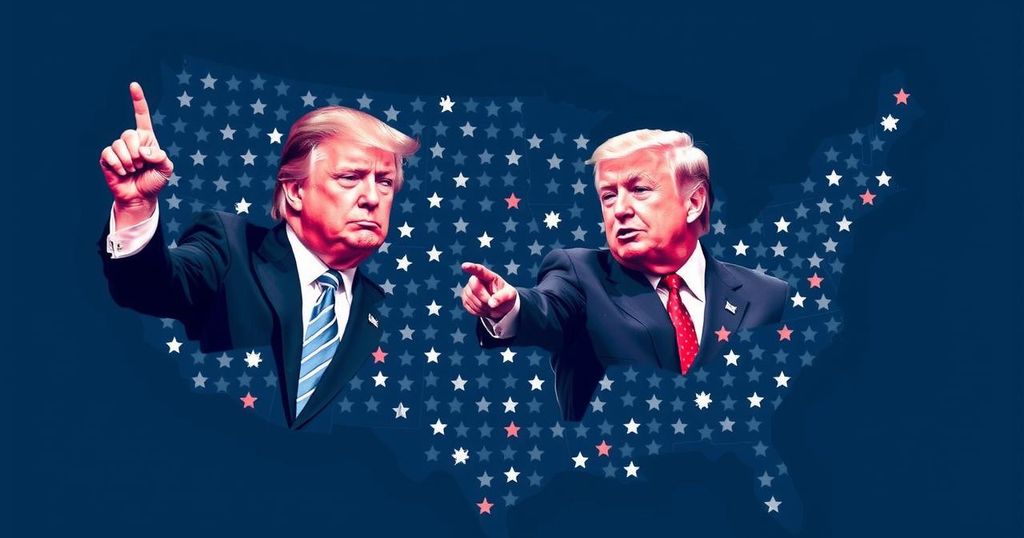World news
AMERICA, ASIA, BENJAMIN NETANYAHU, DEMOCRATIC PARTY, DONALD TRUMP, EAST, ELECTION, FOREIGN POLICY, GAZA, GAZA CONFLICT, GAZA STRIP, HAMAS, HEZBOLLAH, ISRAEL, KAMAL, LEBANON, MIDDLE EAST, MIDDLE EAST CONFLICT, NET, NETANYAHU, NORTH AMERICA, PRESIDENTIAL ELECTIONS, TEL AVIV, U. S, UNITED STATES, WASHINGTON, WHITE HOUSE
Fatima Alavi
0 Comments
Foreign Leaders Respond to Donald Trump’s Victory Claim in 2024 Election
Foreign leaders have reacted to Donald Trump’s claim of victory in the 2024 U.S. elections with a mixture of support and trepidation. Israeli Prime Minister Netanyahu celebrated Trump’s return as a historic moment for their alliance, while European leaders expressed concerns over NATO and U.S. commitments to Ukraine. The reactions reflect a significant divide in global sentiment regarding Trump’s political resurgence and its implications for international relations.
As former President Donald Trump declares victory in the 2024 U.S. presidential election, a range of reactions from foreign leaders highlights varying sentiments regarding his potential return to the White House. Israeli Prime Minister Benjamin Netanyahu expressed exuberance, calling Trump’s comeback “history’s greatest comeback!” and emphasizing the importance of the U.S.-Israel alliance. In stark contrast, European allies like U.K. Prime Minister Keir Starmer maintained cautious optimism, emphasizing their shared values despite differing political policies, while others, such as Hungary’s Viktor Orbán, praised Trump’s reported electoral success as a pivotal moment for the world. Moreover, the leadership in Russia views Trump’s rise as a potential shift in U.S. foreign policy, particularly regarding the ongoing conflict in Ukraine. Overall, the international landscape remains divided, reflecting deep-seated concerns over Trump’s policies towards NATO, Ukraine, and transatlantic relations. The global response to Donald Trump’s announcement of victory in the 2024 U.S. election reveals a tapestry of approval, apprehension, and strategic calculation among foreign leaders. On one end, Netanyahu applauded Trump’s anticipated presidency as a major moment for both nations, citing a strengthening of ties amid ongoing regional tensions. His sentiments were not isolated, with Orbán commending Trump’s win as crucial for a global reevaluation of leadership, though his focus has often been on nationalistic and anti-immigrant policies. Conversely, leaders from Europe expressed hesitations about Trump’s somewhat isolationist stance and its implications for NATO and support for Ukraine. Macron’s remarks underscored these anxieties while expressing a desire for collaboration, setting the stage for a complex new chapter in U.S. international relations. The article highlights the reactions of foreign leaders following Donald Trump’s premature claim of victory in the 2024 U.S. presidential elections. Various leaders expressed a mix of support and concern over what Trump’s presidency could mean for their nations and international alliances. As the world watches, these reactions have been shaped by Trump’s controversial past policies and the prevailing geopolitical climate, particularly concerning relationships with Israel, Europe, and Russia. “Your historic return to the White House offers a new beginning for America and a powerful recommitment to the great alliance between Israel and America.” – Benjamin Netanyahu “Congratulations, President @realDonaldTrump. Ready to work together again as we did during your first term. With respect and ambition. For more peace and prosperity.” – Emmanuel Macron “I warmly congratulate Donald J. Trump. The EU and US are more than just allies. We are bound by a true partnership between our people, uniting 800 million citizens.” – Ursula von der Leyen Currently, no external links have been referenced in the article. In conclusion, the global reaction to Donald Trump’s declaration of victory reflects a complex interplay of support, concern, and strategic recalibration among international leaders. From Netanyahu’s enthusiastic praise to European leaders’ cautious engagement, it is evident that while some foster hope for bolstered alliances, others brace themselves for potential shifts in U.S. foreign policy. As events unfold, the ramifications of Trump’s return could reshape both regional dynamics and international relations significantly.
In the context of the 2024 U.S. presidential election, Donald Trump is once again a central figure in American politics, having previously held the presidency from 2017 to 2021. His political style and policies stirred mixed responses domestically and internationally, notably impacting U.S. relationships with allies and adversaries alike. Trump’s leadership is characterized by its distinct focus on nationalism and skepticism toward established alliances, particularly with NATO and the EU. Consequently, foreign reactions to Trump’s claim of victory reflect broader concerns regarding U.S. foreign policy, international stability, and ongoing conflicts such as in Ukraine and the Middle East.
Ultimately, the varied responses from global leaders to Donald Trump’s claimed victory underscore significant geopolitical implications. While certain leaders express optimism about strengthened alliances, there remains a palpable undercurrent of uncertainty regarding America’s direction under Trump’s leadership. As nations navigate this potential shift, the coming months may reveal much about the future of international cooperation and the U.S.’s role on the global stage.
Original Source: www.cbsnews.com




Post Comment